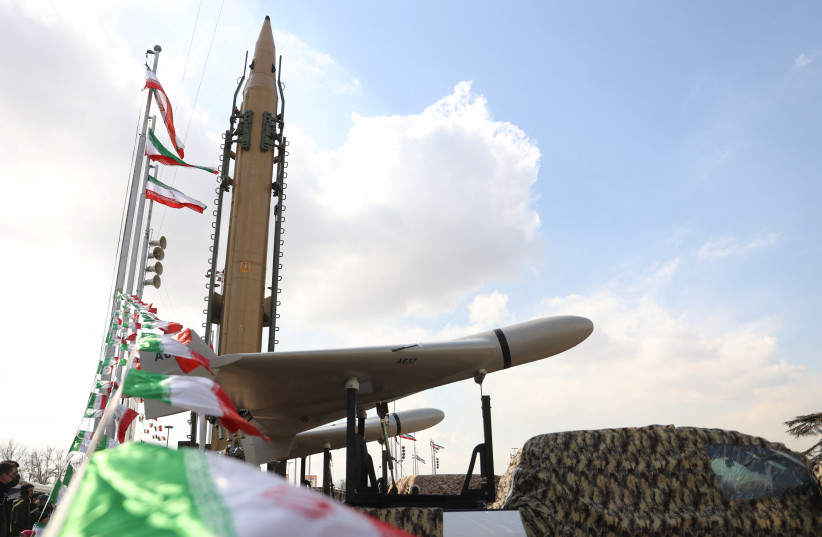Iranian President Ebrahim Raisi threatened Israel in a speech commemorating Army Day, an annual event in Iran. The parade, which took place Tuesday, included displaying senior commanders of the armed forces on a stage near the shrine dedicated to the late Ayatollah Ruhollah Khomeini. The event included combat aircraft and army ground forces units, in an annual opportunity for Iran to show off its armed forces.
Iran seeks to display its power
Raisi’s threats against Israel indicated that, while Iran maintains its determination to destroy the Jewish state, its boasting about fighting against it is shifting a bit, as are its interests: displaying its regional power. Iran recently reconciled with Saudi Arabia, it feels confident of its success in Yemen, and its Foreign Minister Hossein Amirabdollahian recently held an important meeting with his counterpart in Oman.
Part of the Iranian plan involves moving resources from Yemen, where it backed the Houthis, to back pro-Iran elements in Iraq, Syria, and Lebanon. Towards that end, it encouraged talks between Palestinian Islamic Jihad and Baghdad, as well as encouraging Hamas to connect with units in Lebanon during a recent flare-up.
A month ago, Iran’s security chief Ali Shamkhani paid important trips to Beijing and Iraq, among other countries, showing that in general, Iran feels confident in its diplomatic achievements. This was clear from statements by Iran’s Foreign Ministry on Monday. It also reportedly invited Salman bin Abdulaziz Al Saud, King of Saudi Arabia, for a visit. The move comes amid a report by The Jerusalem Post that the window for an Israel-Saudi deal may close in 2024, according to US Sen. Lindsey Graham.

Iranian armed forces chief Gen. Mohammad Bagheri praised the armed forces, as well as Hezbollah, on the eve of Army Day: “What one observes at global and regional levels is indicative of the reality that global and regional trends are undermining the global arrogance and pushing the Israeli regime into collapse,” Bagheri said.
Raisi’s comments must be seen in this context – praising the army for bringing “security” to the region, a region he said he thinks the US should leave. He contrasted the “threats to security” the US had brought with it, with the security that Iran brings. He also said that “the Zionist regime” is aware of Iran’s power and that the “slightest action against our country will be met with a harsh response and will be accompanied by the destruction of Haifa and Tel Aviv.”
The regime projects confidence
For Iran’s pro-regime media, the emphasis was on two elements: the demand that the US leave the region and the threats to Israel. Overall, the regime’s attitude portrays confidence in its policies and its belief that its long-term investment in pro-Iran elements and militias in Yemen, Iraq, Syria, and Lebanon has paid off.
This is a long-term investment; Iran has been active in Lebanon since the 1980s and has held allies in Iraq since the around that time as well. Today, it has a partnership with the Syrian regime.
However, its actions carry setbacks. When Iran began openly supporting the Houthis in Yemen, this fueled Saudi Arabia’s intervention in Lebanon in 2015. Iran then used the Houthis as a testing ground for missiles and drones against Riyadh.
In Iraq, the threat of ISIS helped fuel Iran’s role in Baghdad, as it enlarged its network of Shi’ite militias in Iraq. Those militias were then incorporated into Iraq’s paramilitary forces in 2018. In Syria, Iran had to pour resources into the country to help save the regime in 2012 and then again 2013. However, by 2017, the regime was on the rebound thanks to Russian support, and Iran benefited by moving resources to Syria that threaten Israel.
Iran’s threats to Israel represent what it calls the “unity of fronts,” an attempt to unify Iranian proxies and allies, such as Hamas, Hezbollah and others, to key them into coordinated threats against Israel. This was seen as a hallmark of the clashes in early April, when rockets were fired from Gaza, Lebanon, and Syria. The Alma Research and Education Center, which covers security threats to the north, illustrated how this threat has manifested itself over the past few weeks in a report noting that Iran has also put an emphasis on supporting Palestinian terrorist groups in the West Bank.
With this broad context in mind, consider that Raisi’s rhetoric matches what Iran has said in the past; he’s consistent. The major difference is that Iran now positions itself differently in the wake of diplomatic success with Riyadh and the potential that Iran can draw-down some of the military support it sent the Houthis.
There won’t likely be a peace dividend from this shift, as Raisi indicates that Iran’s overall goal is regional hegemony right now. It intends to slowly chisel away at the US role in the region as it pushes its forces closer to Israel, ratcheting up its genocidal threats on Jerusalem.
